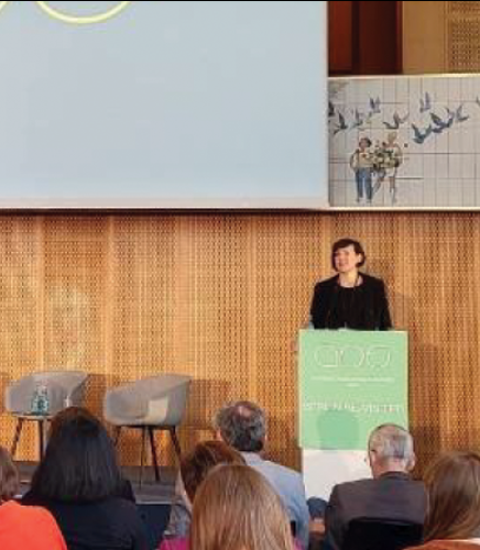
5 April 2023 | Rasjel van der Holst, IOS Press, Amsterdam, NL
With a theme of “Building Technological Support for Scholarship and Scientific Publishing,” the 18th conference of Academic Publishing in Europe (APE) met in Berlin in January 2023. Nearly 200 professionals working in scientific, technical, medical (STM) publishing came together to discuss the progress of as well as express their opinions on scientific publishing. Author and Publisher Rasjel van der Holst* shares her first-hand experience of attending the event as it returned to convening in person.
*Any opinions expressed in this article are the author’s own and do not represent the views of IOS Press.
18 years of APE
This year marked the 18th meeting of the Academic Publishing in Europe (APE) Conference, which convenes annually in Berlin. This year’s meeting welcomed around 200 professionals working in STM publishing, offering a varied program regarding the overall progress of scientific publishing and serving as a forum to express opinions on the subject. While the last two conferences were virtual due to the pandemic, this year’s event could finally meet in real life, and it was wonderful to have face-to-face interactions with colleagues who share this expertise. The event’s hybrid format, in-person and virtual, allowed even more participants to attend, learn and reflect on what keeps the scientific publishing industry occupied: the challenges, developments, and exciting new advances.
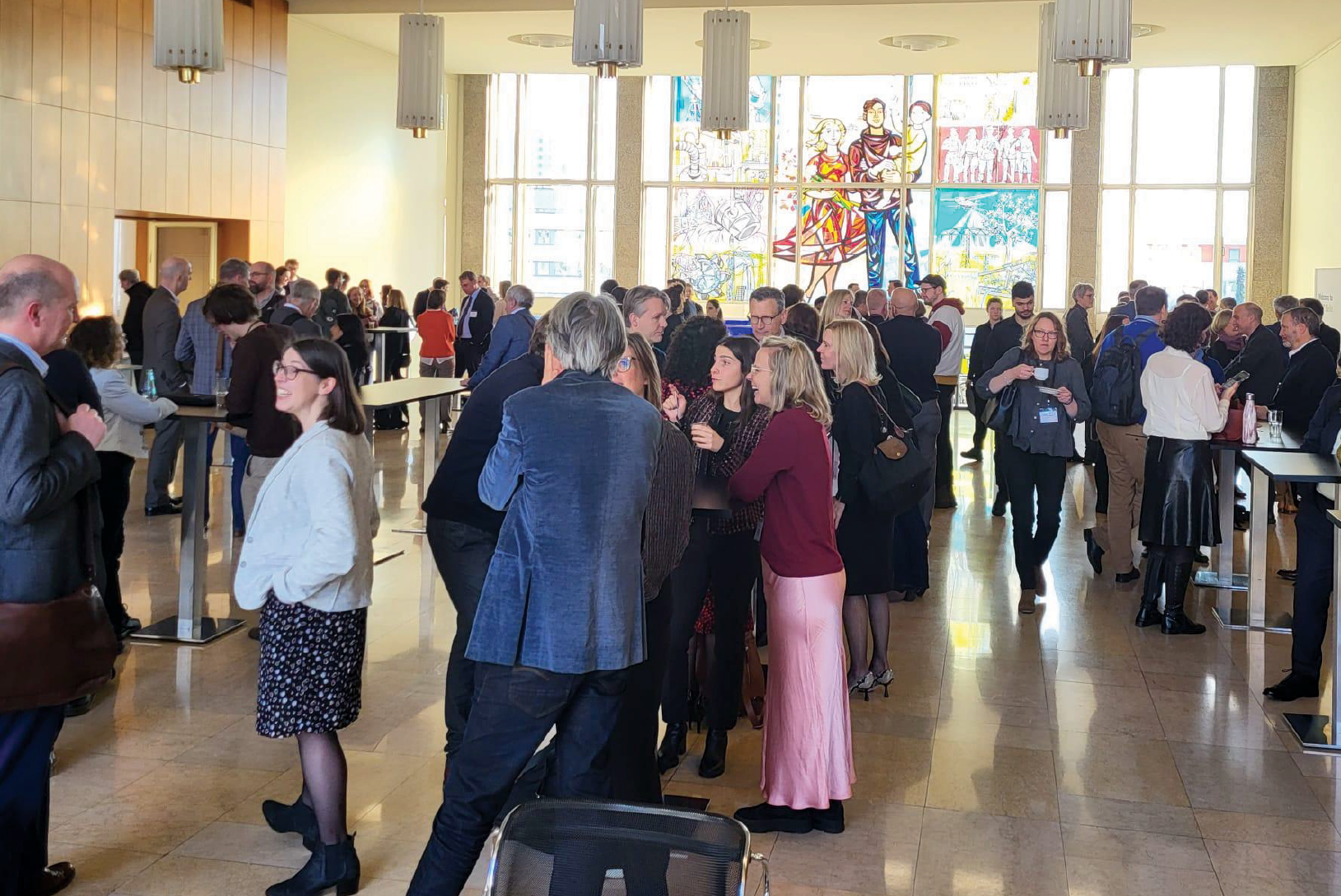
After two years of virtual conferences due to the pandemic, this year’s event met in real life. The author found it wonderful to have face-to-face interactions with colleagues who share this expertise.
APE moved from its classic location on the Gendarmenmarkt to the newly-chosen European School for Management and Technology (ESMT) building in the city center. Delegates enjoyed a wonderful view of Berlin’s architecture (and its continuous rebuilding) from the grand meeting room, and networked alongside the building’s impressive stained-glass windows. As usual, participants enjoyed a fine dining experience, this time in restaurant Gendarmerie.
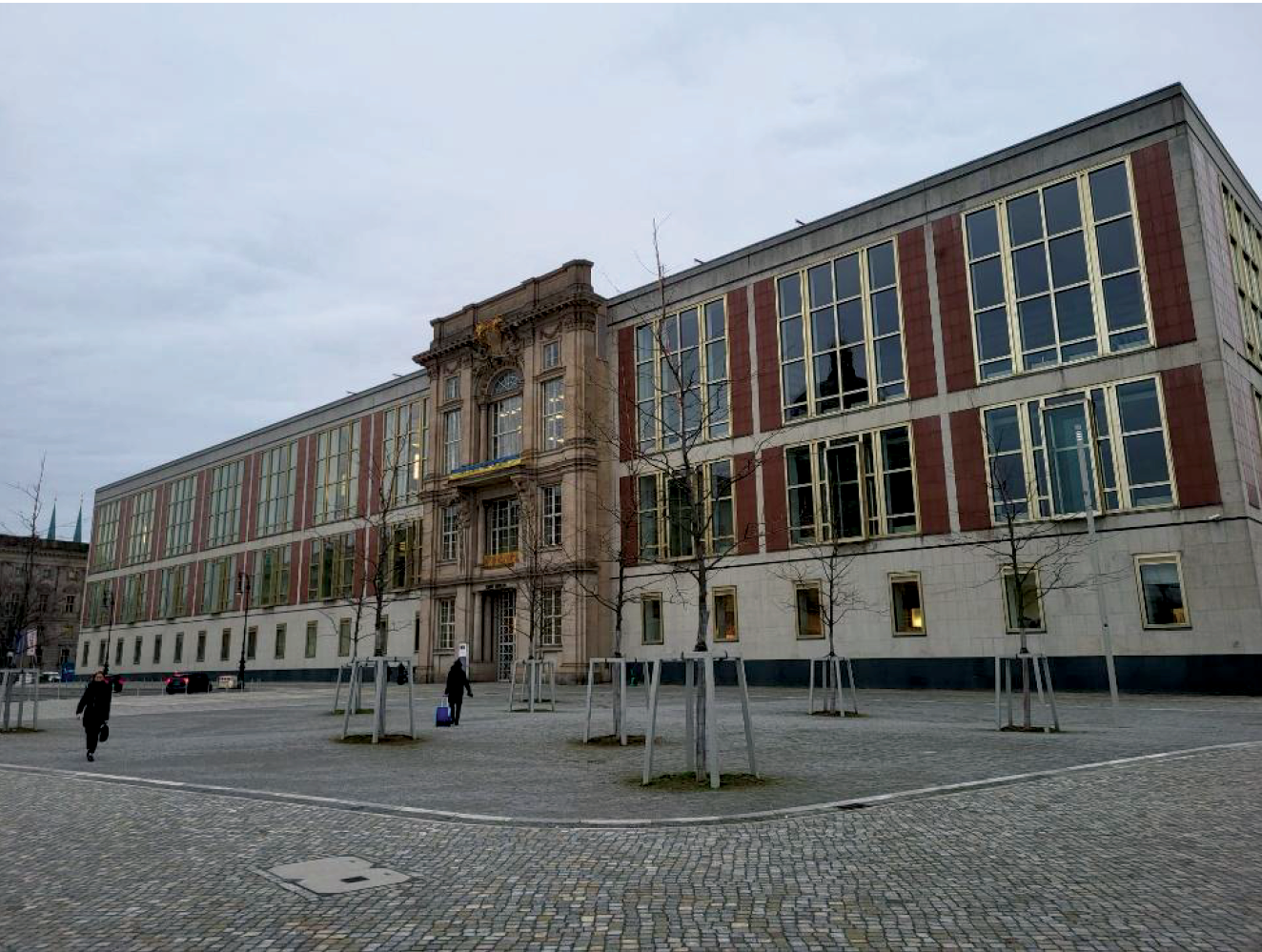
APE 2023 was held in the European School for Management and Technology (ESMT) building in Berlin’s city center.
Day 1 kicked off with remarks by Dr. Ulrich Dirnagl
Given by Dr. Ulrich Dirnagl, the Opening Lecture offered a warning: do not adhere to the status quo. "Academia has created a reputation economy, where researchers are the creators of the product: the article. We should instead reward open science and conduct. We should likewise not ignore the 'dark matter' of academic output: null results and clinical output (where only 39% of results are made public)." Prof. Dirnagl also warns that peer review should not be the sole trustee of the scholarly record. My stance is that this is indeed a long-standing open discussion, where everyone usually agrees with the point, but consents that maybe it is not a perfect system, but we have no better one. Here, the point is well taken but the answer to the conundrum is still not in sight.
Analysis of scientific publishing’s recent developments
The first session of the day was the Leadership Panel: “Embracing the New.” Several major developments were analyzed, from the emerging prominence of pre-prints (and the concerns that they cause), the pressures to keep innovating (“if you stop moving forward, you’re dead”), and the difficulties in offering new services to authors and getting people to even try them out. There was a commiseration whether we have even truly innovated: Yes, we digitalized, but the publishing process has overall stayed the same. The major shift has been that the open access movement has caused publishers to shift focus from readership to the author’s perspective. Some major complications that were listed include:
- Growth! There are more authors looking for outlets. Competition has risen. New predatory journals have entered the fray. There is journal saturation.
- Peer review: The system is pressured and finding peer reviewers is becoming harder (even named the “Peer Review Crisis”). Meanwhile, the job of the peer reviewer becomes more complicated with the rising emergence of fraud and integrity checks.
- The pressures to succeed for authors, related to impact factors, careers and funding.
- How to certify open data and open science.
Thankfully, a few solutions and key takeaways were also given. For example, publishers are increasingly concerned with solving equity problems for authors, diversifying editorial boards, and offering new opportunities and waivers. We were given the advice to use the market to experiment.
A takeaway I particularly took home: We can work together towards a more economically sustainable form of Open Access. The transformative agreement can possibly solve the issue of equity in journals. The social sciences can ride the wave of their sister STM journals. The question may be, “can the little fish survive?” As an employee of a comparatively little fish, I have confidence that we can!
After lunch, we continued with the Keynote on “Sustainable Transformation” given by Prof. Jorg Rocholl. This lecture was rather refreshing and gave a broad overview on university life over the decades, how leadership evokes change, new strategies are needed, and one can become the translator between the two. Prof. Rocholl spoke about dealing with digital fatigue as well as how digitalization should not replace face-to-face interaction, but needs to be used as an elemental new accompaniment. He emphasized the importance of sustainable transformation, giving the example that there is a loss of biodiversity and there is climate change leading to rising temperatures, both of which are measurable. Yet the effect of the loss of a species to our planet, or how much biodiversity and climate change affect each other, is immeasurable. Still they are interdisciplinary, especially in times in which the threat of a new pandemic due to climate change’s impact becomes a new serious risk, and leaders must be able to see the full picture.
The session on "Innovation, Technology and Infrastructure" used the catchphrase “out with the old, in with the new!" That is easier said than done of course, when your industry relies on decades of trusted methods and change is notoriously slow. Of course, the industry certainly does not stand still, and a review of the past topics headlining the APE conferences (from Digitalisation to Open Access to Funder’s Mandates) shows that there are nuts that have been cracked.
Still asking how to measure Scientific Output
How to measure scientific output has been a longstanding discussion, with the impact factor (IF) contentiously coming out as the winner, though with much wailing and complaining from across the field. Clarivate VP Dr. Quaderi noted that it is important to use metrics responsibly, and that the IF should be used to profile journals, but not to rank individual researchers. One of the changes that the IF will see this year is that the number of decimal places is being reduced (so instead of a 7.123 IF, a journal will simply have 7.1), and emerging journals from the ESCI database will receive an impact factor for the first time this year. My note is that Web of Science has profited significantly by being one of the major measurements used by institutions to assess how a researcher’s output is valued. It can contribute to making or breaking careers. A question raised was who could make that change to the system (which honestly is not WoS’s responsibility)? Is it the government, funders, institutions? I believe there was a silent concession that publishers do not make the policy and are forced to play the impact factor game without the capability to change it.
Other key points from the session were to move away from the PDF as the major research output and qualifier (a complaint heard for many years, and well taken again), and to focus more on the key output of the results.
The closing session of the day was the most interesting according to my interests: “(Re)Building Trust in Research Integrity.” All publishers are affected by wholescale fraudulent behavior in the publication field and are having to issue retractions on a much larger scale than ever before. At IOS Press, we are continuously educating ourselves about the malicious infiltration of Paper Mill articles into our scholarly record, alongside image fraud, plagiarism, fake authors, fake institutions, fake emails, fake data, leading to fake news, all making our everyday work so much harder than before. Where before we were operating a system based on trust, and where you relied that we as publishers, the editors and authors, were all working towards the all-important goal of bringing new and exciting research out into the world to advance human society as a whole (of course while factoring in the business aspect of the matter). Sadly, nowadays someone’s incentive to publish can no longer be predicted or assumed. The questions here were who is responsible for solving this problem? How can technology help? And how do we rebuild trust?
The quote of the day was given by Chris Graf of Springer Nature who told us to remember that “Science is brilliant and thriving! We must advocate for science!“ This received a burst of applause and was a nice moment of optimism and a call for solidarity. Meanwhile, Chris also acknowledged that “we became too reliant on trust,” and it was noted that the more you look into the problem of research fraud, the worse it gets. Several interesting points were made as the discussion moved along:
- Discouraging the offenders is important, do not let infractions slide.
- Moving to full open access creates good will which will allow us to focus on integrity.
- Do not feel shame for retracting papers: We are all doing it and it means you are watching closely.
- The problems are broad, therefore we need to invest in the tools and training to identify problems, and not simply rely on peer reviewers to do it for us.
- We need to make proper use of identifiers and authentication.
A consensus amongst the panel seemed to be that making research data openly available would be a major solution, until it was pointed out by an audience member that people willing to commit fraud can fake data. A real answer to this apt remark could, in my opinion, not be given. At the same time, I am coming to grips with the fact that fraud exists, everywhere, always, where there are stakes or gains to be had. All we can do is our best to help weed out as much of it as we can. Editorial offices are not the perpetrators or guilty of the offense; we are a line of defense.
The cap of the day was the APE Lecture, given by Prof. Dr. Gunter Ziegler, President of the Free University in Berlin, on the “Journal of Impossible Results.” The lecture was well-spoken, amusing and engaging, and basically a humorous celebration of science. Several examples were given of once thought to be impossible theories, which were proven to be possible indeed after the application of the scientific method to the problem. A nice play on journals and the ever-steady advancements of science!
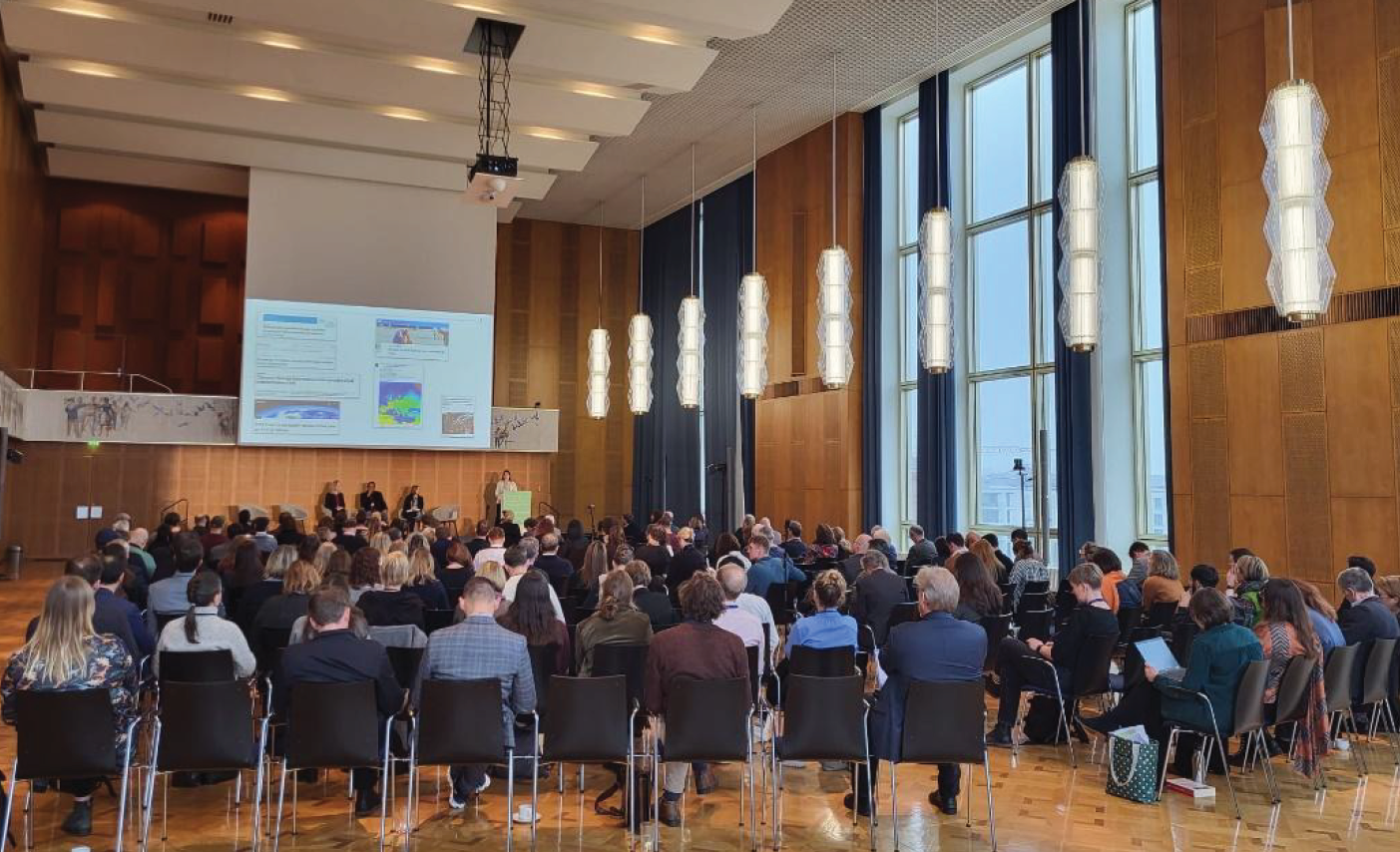
Day 2 started up with start-up pitches
The second day kicked off with the recurring “Dot.com’s to Watch” session, always one of my favorites. A number of startups get a chance to profile themselves to the industry in 20 minute flash presentations, and then the audience votes on which of these pitches they find most interesting. Of course, as a startup, you may only need that one interested partner, so it is a great way to promote yourself. This year the startups were:
- imagetwin.ai: image plagiarism and manipulation detector
- ScientifyRESEARCH.org: a platform connecting funding to research
- Sciscore.com: research article methods checker, making sure your data is in order
- hum.works: data collection platform for businesses to analyze their linked data
- Audemic.io: creates an audio-version of scientific papers
- Prophy.science: reviewer finder tool
Of these startups, it was not surprising that Prophy.science was the audience’s favorite. The “peer review crisis” (a problematic shortage of timely, good reviewers) was mentioned on several occasions during the conference. Finding suitable peer reviewers is one of the main obstructions to scientific publishing today, delaying decision times and frustrating authors and handling editors alike, and any tool that can help match a paper to a peer reviewer is of interest. However, for me personally I liked Imagetwin.ai the best. Plagiarism and image manipulation are very urgent issues, and I would love to use this tool to verify the authenticity of an article’s images, ideally as an add-on in Editorial Manager and even more ideally, as part of iThenticate.
My kudos to all the dotcoms that presented on this day: I generally find this the most energetic, engaging session, which is always a good way to kickstart the morning.
After the coffee break was a (perhaps a little too) long session called “Stepping up on Climate Action.” It is really good to learn that businesses are actively engaged with sustainable developments and reducing their carbon footprint, working towards the regulations stipulated by the Paris Climate Agreement, and ambitions beyond this.
Publishing has traditionally been the behemoth of leaving a paper trail. Nowadays, the majority of our publishing activities have moved online, though improvements can surely be made. As a medium-sized publisher, IOS Press cannot compare to the big publishing houses and has more modest goals to reach, but learning from others’ initiatives leads to new insights even on a smaller scale. Let us all hope that it does not come too late: One of the main takeaways from our Berlin visit this year, and frequently mentioned among the delegates, was how unseasonably warm it was for a January in Berlin.
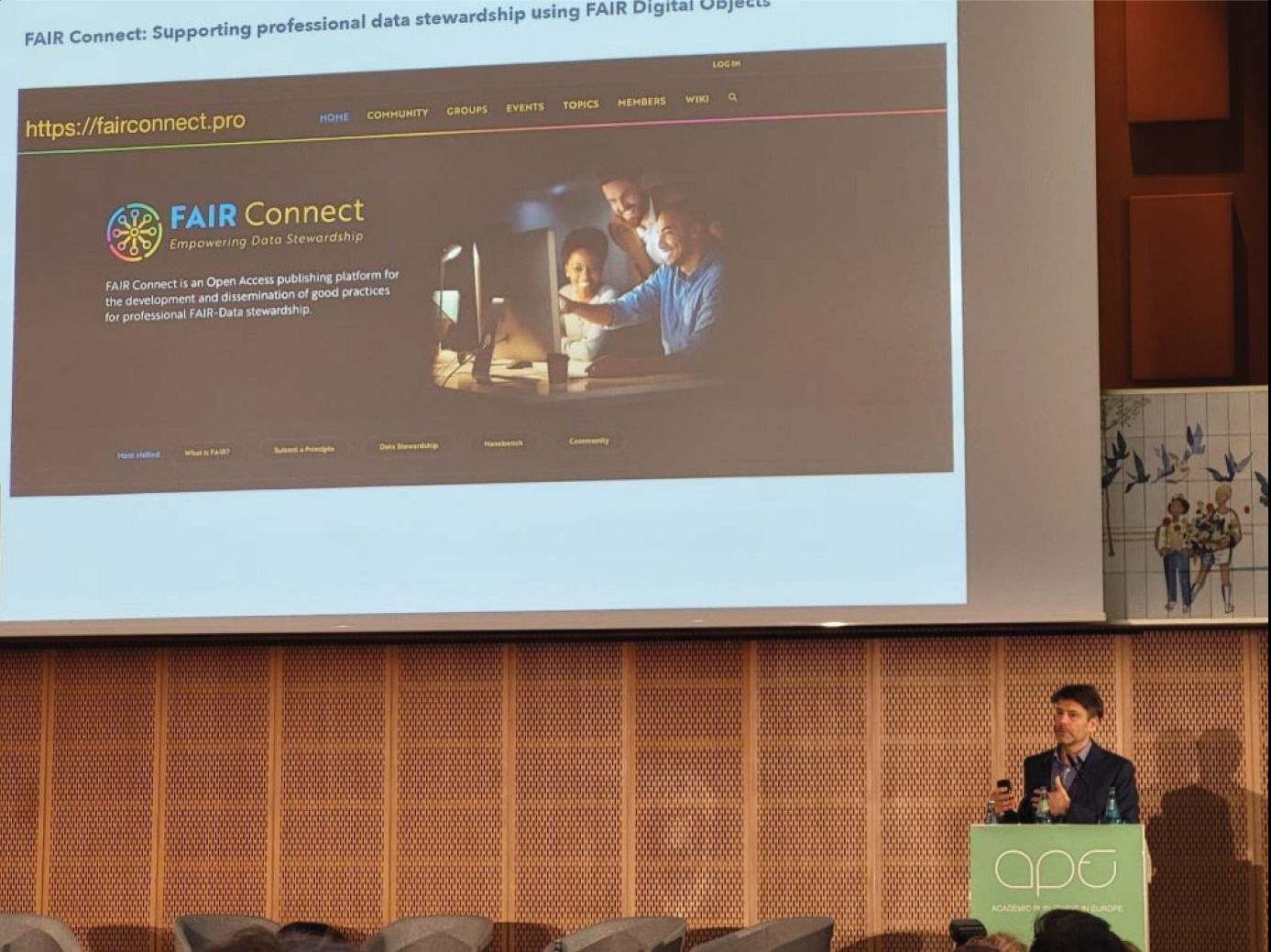
Dr. Erik Schultes presented FairConnect, a new publication data portal created in collaboration with IOS Press to expand on the principles of FAIR (Findable, Accessible, Interoperable, Reusable) data publication.
Following lunch, a broad session entitled “Bold new paradigms – in it for the long-term” enlightened us on important new developments trying to shift publishing paradigms. The session explored various new ways of dealing with topics like identifiers, data handling, and new ways of publishing and stewarding research data. As an employee of IOS Press, watching this session was particularly gratifying because Dr. Erik Schultes presented FairConnect, a new publication data portal created in collaboration with IOS Press to expand on the principles of FAIR (Findable, Accessible, Interoperable, Reusable) data publication. According to Dr. Schultes, making published research data FAIR is a huge job ahead of us, and demands over 500K well-trained jobs (perhaps it’s time to get started with training)! Session Chair Liz Marchant emphasized how the task of dealing with data is here to stay, and we as publishers will want to think about if or how we want to be involved.
The session on the “‘take away’ from Projekt DEAL” (“DEAL” is a consortium-like organization to benefit all German academic institutions by offering a one-pay model to read and publish open access in a journal/collection) was of interest to many. This particular deal was made with the largest publishers, Springer and Wiley, while notoriously no common ground could be found with Elsevier and no deal was made. Dr. Irina Sens warned that “once you start, there is no way back!” These types of deals are likely the subscription deals of the future, but will lead to a full barrage of negotiations, and with the traditional subscription deal, it will go to show if the smaller publishing houses can keep up. IOS Press has several deals in place, and as they expand, it seems we would once again go back into subscription sale territory rather than an author paying for the Open Access model, which is not necessarily a bad development.
The last session of the day brought several “Early Career Researchers” together to discuss their needs and expectations from scholarly publishers. A worthwhile discussion, although unfortunately I had a flight to catch, and left early. I was likewise unable to attend the APE Award presentation, but congratulations to the winner, Vsevolod Solovyov, who won for his work on Prophy.Science (part of the dot.com session). The relevance of his work is very nicely highlighted by the award’s sponsor here.
And with that, I bid APE 2023 farewell and look forward to seeing what’s in store next year!
shreyasri01
Hello!!
Amazing post . Thank you for sharing with us.
Here is the list of<a href=https://tractorkarvan.com/blog/what-is-floriculture> For farmers looking for the Floriculture in India.
shreyasri01
Hello!!
Amazing post . Thank you for sharing with us.
Here is the list of<a href=https://tractorkarvan.com/blog/what-is-floriculture> For farmers looking for the Floriculture in India.
